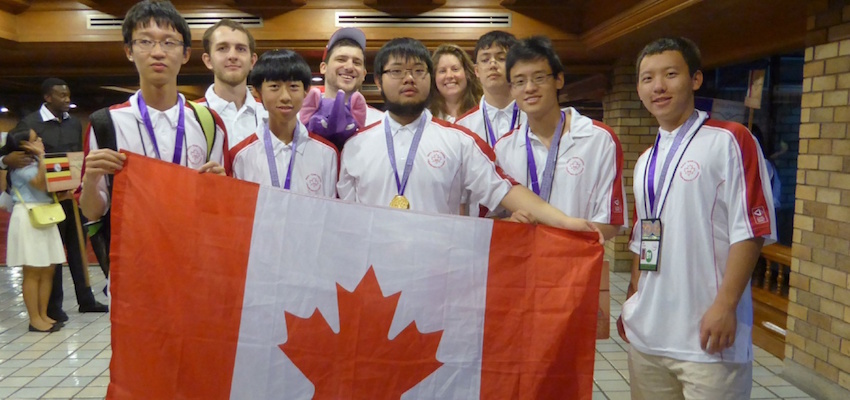The International Math Olympiad (IMO), a competition featuring the brightest young mathematical minds from around the world, wrapped up earlier this month in Thailand. The big news was that the US managed to seize the top spot from perennial powerhouse China. Now, without a doubt, Team USA is no slouch — since their last victory in 1994, the Americans have consistently appeared in the top 5, along with other strong performers like Russia and South Korea. But China’s dominance has been absolute, with the country appearing outside of the top two spots just once in the past 28 years, and winning outright in a majority of those occasions.
But look carefully at recent results, and you’ll notice that relative minnow Canada has started to inch its way into the league of top mathematical nations. For years, the Canadian squad performed respectably, if not spectacularly, ranking in the top 30 on a regular basis. That’s not to say that Team Canada hasn’t had any remarkable individual successes over that time. In 2004, 16-year old Jacob Tsimerman achieved a perfect score in the competition, one of only four such perfect examinations in the world that year. In the late 1980s, future Stanford math professor Ravi Vakil earned two straight gold medals, and later became one of the few four-time Putnam Fellows in the university-level Putnam Mathematical Competition. But the structure of the IMO is such that one or two excellent performers in the 6-person team is not sufficient to gain access into the rarefied top 10. The team must be strong as a whole, with few — if any — weak links.
In the past four years, however, Canada has started posting a string of remarkable results, with three top 10 finishes and another in 11th place. So what’s causing this upsurge? Tsimerman, now a professor at the University of Toronto and coach of Canada’s 2015 team, suggests that several factors may be working in Canada’s favour. “Beginning about 8 years ago we began a trend that saw the training camps being run by returning IMO contestants,” Tsimerman notes. “This has had very good results I think, as the past contestants have a better understanding of the material and the students’ mindsets.”
Coaching is certainly part of the equation. But without strong students, your probability of success vanishes. Enter Alex Song. Song, a modest, soft-spoken student who is heading to Princeton University this fall, has been a force of nature for Team Canada. “Alex Song has been on our team 6 times now, winning 5 golds, a perfect score this year, and thus topping the IMO Hall of Fame,” a list of the top Olympiad performers of all time. Song has officially entered math superstar territory. But, as Tsimerman observes, perhaps Song’s most important contribution has been to his fellow team members. “Having good students makes the rest of the team better as well, as he gets to interact with them during the camps and that’s extremely valuable.”
Recent successes aside, the real question is whether Canada can become a permanent fixture among the elite mathematical nations. Tsimerman worries that the recruiting pipeline for strong students may be the biggest roadblock. “The thing to realize about Canada is while we have a fairly big population, our base level contest (the COMC) is only written by about 5,000 high school students. This is something we should actively try to fix … since we draw from such a small pool.” Other countries seem to have the right idea, Tsimerman notes. “The UK has their base level contest written by ~200,000 students, and they have only double our population!” If Canada wants to be a major player at the IMO, the problem is well-defined: scour the country to find and nurture the next generation of mathematical talent.
Don’t miss our newest stories! Follow The 10 and 3 on Facebook or Twitter for the latest news and analysis.
